The allure of a refreshing swim on a sunny day can be hard to resist, even when you’re battling a bothersome sinus infection.
However, the question of whether it’s safe to dive into the pool or take a dip in natural waters while dealing with sinus congestion and discomfort is a valid concern.
In this post, we’ll explore if is it okay to go swimming with a sinus infection. We’ll provide insights into the factors to consider, offer tips for safe swimming, and highlight scenarios when it’s best to avoid taking the plunge.
Understanding the relationship between sinus infections and swimming can help you make an informed decision, prioritizing your well-being and the enjoyment of your aquatic adventures. Stay sharp.
What Is Sinus Infection?
A sinus infection, medically known as sinusitis, is an inflammation or swelling of the tissue lining the sinuses, which are air-filled cavities in the skull around the nose and eyes.
It can be caused by viral, bacterial, or fungal infections, as well as allergies or other irritants.
Symptoms often include nasal congestion, facial pain, pressure, and tenderness, a runny or stuffy nose, cough, and reduced sense of smell.
Sinusitis can be acute (short-term) or chronic (lasting longer than 12 weeks). Acute sinusitis is usually the result of a viral infection and can resolve on its own, while chronic sinusitis may require medical treatment.
Common remedies include rest, hydration, over-the-counter medications, and sometimes antibiotics in the case of bacterial infections.
Is It OK to Go Swimming with a Sinus Infection?
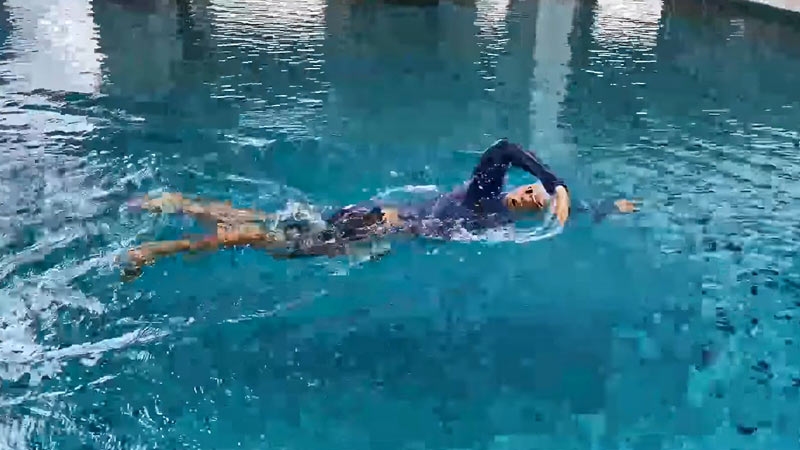
Swimming with a sinus infection is generally not recommended, as it can potentially exacerbate your symptoms and lead to other complications.
Here are a few reasons why you should avoid swimming when you have a sinus infection:
Risk of Ear Infections
When you swim, especially in pools or natural water bodies, there’s a risk of water entering your nasal passages and potentially traveling up the Eustachian tubes into your middle ear.
This can increase the likelihood of developing an ear infection, which can be painful and may require medical treatment.
Worsening Sinus Congestion
The pressure changes and exposure to cold water in a swimming environment can worsen sinus congestion and inflammation. This can make your symptoms more uncomfortable and prolonged.
Weakened Immune System
Sinus infections are often the result of viral or bacterial pathogens.
Immersing yourself in water with a compromised immune system can increase your vulnerability to other infections and illnesses, making your recovery process slower.
Discomfort and Reduced Enjoyment
Swimming is meant to be an enjoyable and refreshing activity. Swimming with a sinus infection may reduce your ability to fully enjoy the experience due to discomfort, congestion, and other symptoms.
Spread of Infection
If your sinus infection is caused by a contagious virus or bacteria, swimming in public pools can potentially spread the infection to others.
It’s considerate to avoid such activities until you’re no longer contagious to prevent the spread of illness.
It’s advisable to wait until your sinus infection has fully cleared before resuming swimming to ensure a safe and enjoyable experience.
Is swimming sinus infection Bad?
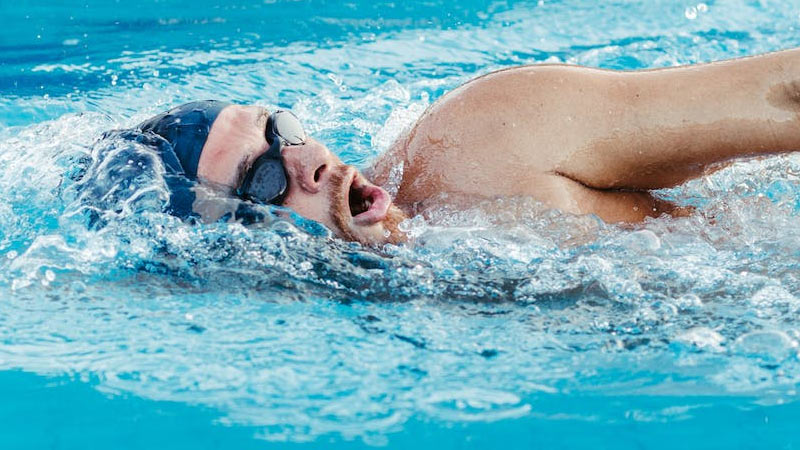
Swimming with a sinus infection can potentially have negative consequences, and it’s generally not recommended for the following reasons:
Aggravation of Symptoms
Sinus infections often come with symptoms like congestion, nasal discharge, facial pressure, and headaches. Swimming, especially in cold water, can worsen these symptoms.
The water pressure and temperature changes can lead to increased sinus congestion and discomfort, making your swim less enjoyable.
Risk of Ear Infections
When you swim, water can enter the nasal passages and reach the Eustachian tubes, which connect the nose and ears.
This can increase the risk of developing ear infections, which can be painful and may require medical treatment.
Weakened Immune Response
When your body is fighting off a sinus infection, your immune system is already compromised.
Immersing yourself in water, especially in public pools, may expose you to other pathogens, potentially leading to more health issues and delaying your recovery.
Contagion
If your sinus infection is caused by a contagious virus or bacteria, swimming in public pools can pose a risk to others.
It’s considerate to avoid swimming until you’re no longer contagious to prevent spreading the infection to others.
Prolonged Recovery
By resting and allowing your body to recover from the sinus infection, you’re more likely to heal faster and experience fewer complications. Swimming when you’re unwell may delay your recovery process.
It’s advisable to wait until your sinus infection has completely resolved and your symptoms have improved before returning to the pool.
Factors to Consider Regarding Sinus Infection Swimming
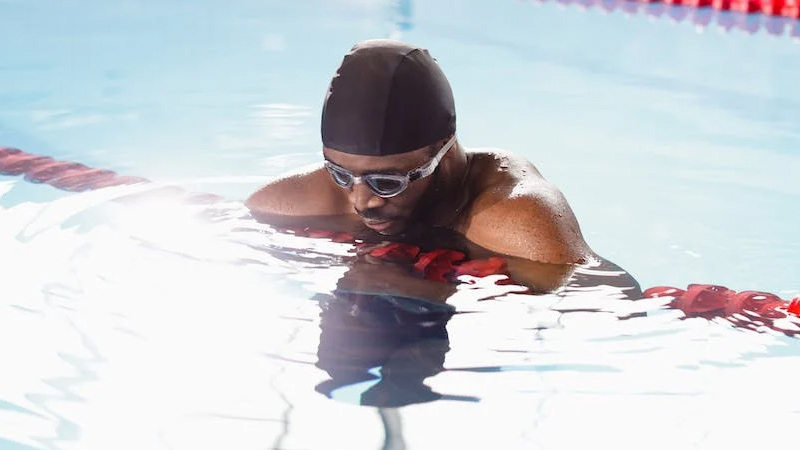
When considering swimming with a sinus infection, several factors should be taken into account to ensure your safety and well-being:
Severity of Symptoms
The extent of your sinus infection symptoms plays a crucial role. If you have mild symptoms like a runny nose or slight congestion, swimming may not be as problematic.
However, if you’re experiencing severe symptoms such as significant congestion, pain, or pressure, it’s best to postpone swimming until your condition improves.
Severe symptoms can be aggravated by swimming and may lead to discomfort.
Water Type and Temperature
The type of water you plan to swim in matters. Swimming in a well-maintained, chlorinated pool may carry fewer risks than swimming in natural bodies of water, where contaminants and bacteria are more likely.
Additionally, the temperature of the water can impact your experience. Cold water may exacerbate congestion and discomfort, so consider swimming in a warmer pool if possible.
Ear Protection
As mentioned previously, sinus infections can be associated with an increased risk of ear infections when water enters the Eustachian tubes.
Wearing earplugs can help reduce this risk and protect your ears from water exposure. Ensure that the earplugs fit comfortably and create a secure seal.
Hydration and Rest
Staying well-hydrated and getting adequate rest are important components of recovering from a sinus infection.
Swimming can be physically demanding, and it’s essential to be in good overall health to engage in physical activities.
If you’re feeling weak or fatigued due to your sinus infection, it’s best to rest and allow your body to recover fully before swimming.
Consulting a Healthcare Professional
When in doubt, it’s a good idea to consult with a healthcare professional, such as your primary care physician or an otolaryngologist (ear, nose, and throat specialist).
They can provide personalized advice based on the severity of your sinus infection and your overall health.
The decision to swim with a sinus infection should be made on a case-by-case basis, considering the factors mentioned above.
Tips for Safe Swimming with a Sinus Infection
If you decide to go swimming with a sinus infection, it’s important to take certain precautions to ensure your safety and comfort:
Consult with a Healthcare Professional
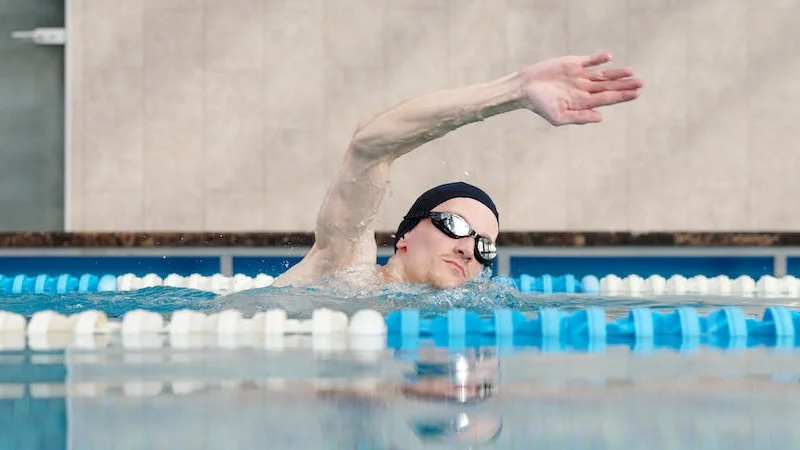
Before heading to the pool, it’s wise to consult with your healthcare provider, especially if you have a chronic or severe sinus infection.
They can evaluate the severity of your symptoms and provide personalized advice on whether it’s safe for you to swim.
If you have any complications or are at a higher risk of ear infections, they can inform you accordingly.
Choose the Right Water Environment
Opt for a clean and well-maintained swimming pool over natural bodies of water.
Public pools, especially those with proper chlorination and sanitation, are less likely to introduce additional pathogens that could exacerbate your condition.
Additionally, consider swimming in a heated pool, as the warmer water may be gentler on your sinus passages and less likely to trigger congestion.
Use Ear Protection
To reduce the risk of ear infections, wear waterproof earplugs while swimming. These can help seal off your ears and prevent water from entering the Eustachian tubes, which can lead to ear problems.
Make sure the earplugs fit comfortably and are securely in place before you enter the water.
Stay Hydrated and Rested
Swimming is a physical activity that requires energy and stamina. Sinus infections can be draining, so ensure you’re well-rested and adequately hydrated before swimming.
Dehydration can exacerbate your symptoms, so drink plenty of water before and after your swim.
Listen to Your Body
Pay close attention to how you’re feeling while swimming. If you experience increased discomfort, severe congestion, or any unexpected symptoms, it’s best to exit the water immediately.
Overexerting yourself in this state can be detrimental to your health and slow down your recovery.
Remember that while these tips can help reduce the risks associated with swimming while having a sinus infection, it’s generally advisable to prioritize rest and recovery until your symptoms have improved significantly.
When to Avoid Swimming with a Sinus Infection?
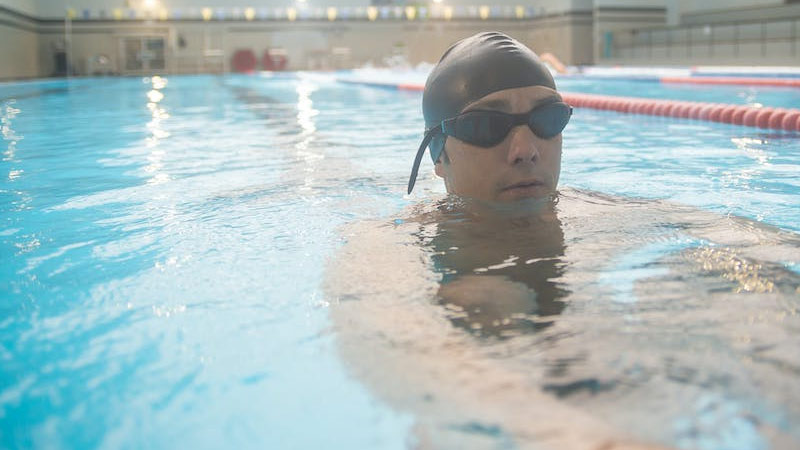
There are several scenarios in which it’s best to avoid swimming with a sinus infection:
Severe Symptoms
If your sinus infection is accompanied by severe symptoms such as intense facial pain, high fever, significant nasal congestion, and headaches, it’s best to avoid swimming.
Swimming can worsen these symptoms and may lead to discomfort and complications. It’s important to prioritize your health and well-being.
Ear Complications
If you’re experiencing ear-related symptoms such as ear pain, pressure, or a noticeable decrease in hearing, swimming should be avoided.
Water entering the Eustachian tubes can lead to ear infections, exacerbating your condition and causing additional discomfort.
Contagious Infections
If your sinus infection is caused by a contagious virus or bacteria, it’s considerate to avoid swimming in public pools or shared water environments until you’re no longer contagious.
You risk spreading the infection to others, which can be a source of discomfort and health concerns for them.
Fatigue and Weakness
Sinus infections can be physically taxing, and they often lead to fatigue and weakness.
Engaging in physical activities like swimming while you’re feeling weak can put additional strain on your body, slowing down the recovery process.
Rest and proper hydration are typically more beneficial in such situations.
Lingering Symptoms
If your symptoms have not improved significantly or have been present for an extended period, it’s a sign that your body is still fighting the infection.
In this case, it’s advisable to avoid swimming until your symptoms have subsided. Swimming with lingering symptoms can prolong the recovery process and increase the risk of complications.
In general, it’s best to prioritize your health and recovery when you have a sinus infection.
FAQs
Can I continue swimming with a sinus infection?
It’s generally best to avoid swimming with a sinus infection, especially if you have severe symptoms. Swimming can exacerbate congestion and may lead to complications like ear infections.
Does swimming help sinus infection?
Swimming does not directly help cure a sinus infection. In fact, it can worsen symptoms.
Rest, hydration, and appropriate medical care are typically more effective in addressing sinus infections.
Should I continue swimming with a sinus infection?
It’s advisable to postpone swimming when you have a sinus infection, especially if symptoms are severe.
Swimming can aggravate congestion and discomfort. Prioritize your health and well-being by focusing on recovery.
Can you swim with a sinus infection?
You can swim with a sinus infection, but it’s generally not recommended. The decision should be based on the severity of your symptoms and the advice of a healthcare professional.
Using precautions like ear protection and choosing the right water environment can reduce risks.
Is swimming and sinus infection related?
Swimming and sinus infection are related in the sense that swimming with a sinus infection can worsen symptoms and lead to complications.
It’s important to consider your health, the severity of your condition, and precautions to make an informed decision about swimming while dealing with a sinus infection.
Wrapping Up
While the idea of swimming with a sinus infection may be tempting, our exploration of this topic reveals that caution is essential.
Sinus infections can vary in severity, and your decision should be based on your symptoms and the guidance of a healthcare professional. Remember, your well-being should always take precedence.
By understanding the nuances of swimming with a sinus infection, you can make informed choices and ensure your aquatic adventures are both enjoyable and safe. Thank you so much.







